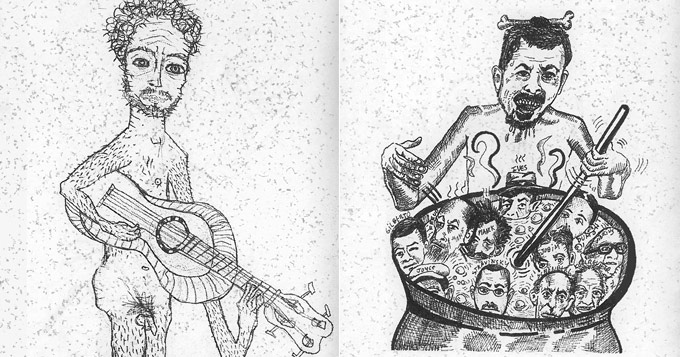
Nicolas Wills (left) and Jazael Olguín Zapata (right), We Were Not Born to Illustrate Books, 2013. Courtesy of Cráter Invertido.
Known for his pioneering role in Brazil’s Tropicália movement—a surge of iconoclastic art, music and politics during the country’s military dictatorship of the 1960s—Tom Zé remains a significant influence for artists and musicians around the world today. Though Tropicália ended as quickly as it began, Zé’s music—a polytonal amalgam of styles including Western rock and psychedelia as well as Bossa Nova and Bahian Samba—reemerged from São Paulo’s fringes in 1989, when David Byrne signed him to his Luaka Bop record label.
Cráter Invertido, a Mexico City-based collective of ten artists and activists, recently published Tom éZ (punning on the musician’s last name and the word “is”), an art book aimed at disseminating Zé’s music and directed toward a Spanish-speaking audience. The book opens with a letter addressed to Zé, explaining the relevance of his ideas to their practice and informing him that “for some time now your music has sounded out through the speakers in our houses, our cars and during our marches.” It also includes translated excerpts of Zé’s 2013 autobiography, Tropicalista Lenta Luta, bound together with essays, illustrations and Spanish translations of lyrics to the songs featured in the mix above.
Cráter Invertido’s choice to mobilize around a Brazilian singer-songwriter comes from more than simply being fans of Zé’s music—it is, in the collective’s words, part of a concerted effort to “shift the panorama of influence and affinities toward South America and break a bit with the colonial inertia of seeking out cultural resonance solely with North America and Europe.”
This impulse to look southward echoes the sentiment behind poet Oswald de Andrade’s 1928 “Manifesto Antropófago” (Cannibal Manifesto), which is also featured in Cráter Invertido’s publication. In his manifesto, a major influence on the Tropicália movement, de Andrade asks, “Tupí or not Tupí? That is the question,” adapting the famous Shakespearean formulation to playfully confront the history imposed on the Brazilian Tupí people, whom Portuguese colonizers described as cannibals. De Andrade embraces an alternative notion of cannibalism that involves consuming European culture, while feeding on local tradition, to reconstruct Latin American cultural production as a mélange of influences. Likewise, for Zé and Cráter Invertido, there remains a desire to reconnect with indigenous art and music and establish alternative networks of collaboration across borders and generations.
This musical compilation, distributed with Cráter Invertido’s publication, features some of the collective’s favorite Tom Zé tracks. It opens with these comments from the artists:
gracias a algunos Tom Zé podemos recordar como las fronteras se desvanecen
thanks to Tom Zé we are reminded that borders can be dissolved
TRACKLIST:
1. Passagem De Som (Jogos de Armar, 2000)
2. Parque Industrial (Grande Liquidação, 1968)
3. Insurgentes, gracias a Dios… (Translation)
4. Augusta, Angélica e Consolação (Todos os Olhos, 1973)
5. Na Parada De Sucesso (Correiro de Estação do Brás, 1978)
6. Nave Maria (Nave Mari, 1984)
7. Cuando llegué de las estrellas… (Translation)
8. Ave Dor Maria (Estudando o Pagode, 2005)
9. En todo el Tercer mundo… (Documentary Fragment)
10. Defeito 13: Burrice (Com Defeito de Fabricação, 1998)
11. Complexo de Épico (Todos os Olhos, 1973)
12. Suelen decir que el nordestino (Documentary Fragment)
13. Menina Jesus (Correiro da Estação do Bras, 1978)
14. Clase Obrera (cover of “Classe Operaria” from No Jardim da Politica, 1985)
15. A Felicidade (Estudando o Samba, 1976)
16. Imaginate que estamos aquí… (Documentary Fragment)
17. Vaia de Bêbado Não Vale (Impressa Cantada, 2003)
18. Sincope Jãobim (Estudando a Bossa, 2008)
19. Toc (Estudando o Samba, 1976)
20. To (Estudando o Samba, 1976)
21. Jimi Renda-Se/Moeda Falsa (Jogos de Armar, 2000)
22. Defeito 14: Xiquexique (Com Defeito de Fabricação, 1998)
23. Uai-Uai-Revolta Queto-Xambá (Danç-êh-Sá, 2005)
24. Apocolipspom (O Fim do Palco do Começo) (Tropicália Lixo Logico, 2012)
25. Chamegá (Jogos de Armar, 2000)
X. Las Fronteras Ze Desvanecen (Frontera entre Disco y Bonus Track)
Bonus Track: Alfombran el dia (La Isla Bonita, Lazaro Valiente, 2011
Y. No tengas miedo de venir a mi concierto… (Documentary Fragment)
—
This piece was made possible, in part, by the Andy Warhol Foundation for the Visual Arts.

